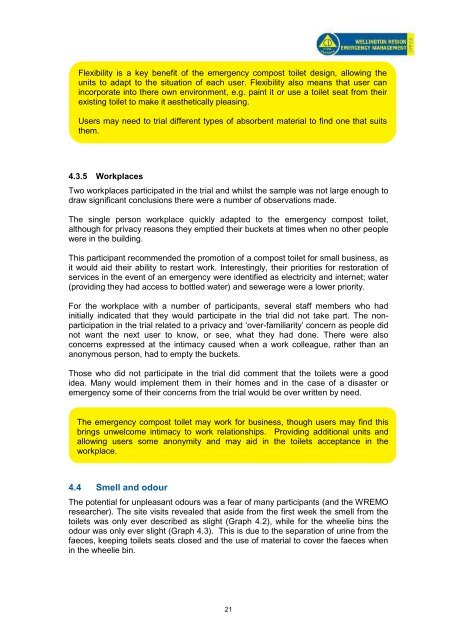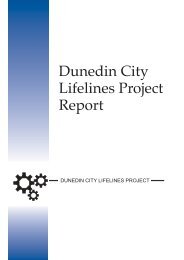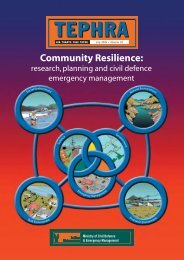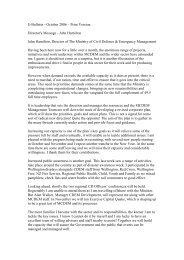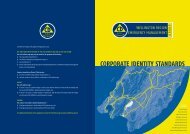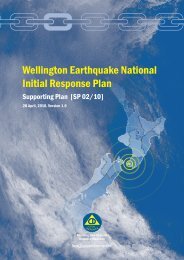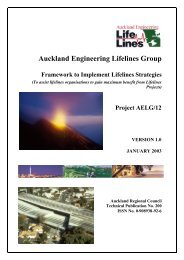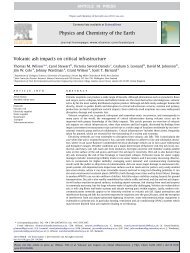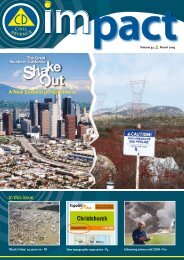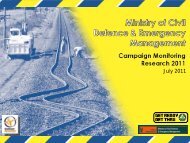Compost Toilet Trial Report - Ministry of Civil Defence and ...
Compost Toilet Trial Report - Ministry of Civil Defence and ...
Compost Toilet Trial Report - Ministry of Civil Defence and ...
You also want an ePaper? Increase the reach of your titles
YUMPU automatically turns print PDFs into web optimized ePapers that Google loves.
Flexibility is a key benefit <strong>of</strong> the emergency compost toilet design, allowing the<br />
units to adapt to the situation <strong>of</strong> each user. Flexibility also means that user can<br />
incorporate into there own environment, e.g. paint it or use a toilet seat from their<br />
existing toilet to make it aesthetically pleasing.<br />
Users may need to trial different types <strong>of</strong> absorbent material to find one that suits<br />
them.<br />
4.3.5 Workplaces<br />
Two workplaces participated in the trial <strong>and</strong> whilst the sample was not large enough to<br />
draw significant conclusions there were a number <strong>of</strong> observations made.<br />
The single person workplace quickly adapted to the emergency compost toilet,<br />
although for privacy reasons they emptied their buckets at times when no other people<br />
were in the building.<br />
This participant recommended the promotion <strong>of</strong> a compost toilet for small business, as<br />
it would aid their ability to restart work. Interestingly, their priorities for restoration <strong>of</strong><br />
services in the event <strong>of</strong> an emergency were identified as electricity <strong>and</strong> internet; water<br />
(providing they had access to bottled water) <strong>and</strong> sewerage were a lower priority.<br />
For the workplace with a number <strong>of</strong> participants, several staff members who had<br />
initially indicated that they would participate in the trial did not take part. The nonparticipation<br />
in the trial related to a privacy <strong>and</strong> ‘over-familiarity’ concern as people did<br />
not want the next user to know, or see, what they had done. There were also<br />
concerns expressed at the intimacy caused when a work colleague, rather than an<br />
anonymous person, had to empty the buckets.<br />
Those who did not participate in the trial did comment that the toilets were a good<br />
idea. Many would implement them in their homes <strong>and</strong> in the case <strong>of</strong> a disaster or<br />
emergency some <strong>of</strong> their concerns from the trial would be over written by need.<br />
The emergency compost toilet may work for business, though users may find this<br />
brings unwelcome intimacy to work relationships. Providing additional units <strong>and</strong><br />
allowing users some anonymity <strong>and</strong> may aid in the toilets acceptance in the<br />
workplace.<br />
4.4 Smell <strong>and</strong> odour<br />
The potential for unpleasant odours was a fear <strong>of</strong> many participants (<strong>and</strong> the WREMO<br />
researcher). The site visits revealed that aside from the first week the smell from the<br />
toilets was only ever described as slight (Graph 4.2), while for the wheelie bins the<br />
odour was only ever slight (Graph 4.3). This is due to the separation <strong>of</strong> urine from the<br />
faeces, keeping toilets seats closed <strong>and</strong> the use <strong>of</strong> material to cover the faeces when<br />
in the wheelie bin.<br />
21


